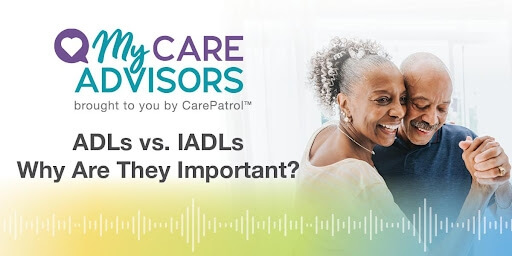
ADLs vs IADLs: Why Are They Important?
When thinking about care options, especially as one ages or for those living with a chronic condition, it is important to consider the support needed to complete activities of daily living (ADLs) to safely live at home. The inability to accomplish essential activities of daily living may lead to unsafe conditions and a poor quality of life. This episode provides information about the importance of activities of daily living and how caregivers can identify when more support is needed.
Click to listen to this episode:
Tune in for insights and resources from Occupational Therapy professional Julie Whitbeck-Lewinski.

About Julie:
Julie is a doctor of occupational therapy with over 20 years of diverse experience that expands across the lifespan serving individuals clinically in settings from early intervention, schools, community-based hospitals, sub-acute rehabilitation, continuing care retirement communities, skilled nursing facilities, also to non-clinical roles in healthcare administration and management. Julie is a certified fall prevention specialist and a dementia care specialist. She has presented nationally at numerous seminars, workshops, and annual conferences throughout her career and provides consultation and training to many assisted living and memory care communities in her area.
Julie and her husband, Don Lewinski, started CarePatrol of Buffalo Niagara in July of 2020, and soon expanded their vast services to Rochester and Syracuse, NY areas. Beyond CarePatrol’s support to navigate senior care and living options, Julie offers older adult driver screenings, in-home safety assessments, independent living skills assessments and more to help families navigate and understand their senior loved one’s needs and options available. Julie is dedicated to developing senior caregivers both professionally and non-professionally, supporting and overseeing students from local universities and colleges engage in special projects for seniors in her community, offering supportive services such as workshops and resources geared towards caregivers, as well as supporting other organizations that serve senior populations throughout Western and Central NY.
Show Notes
- What are activities of daily living or ADLs.
- The difference between Basic ADLs and Instrumental ADLs and why is this important for older adults.
- Conditions that can affect the ability to perform Basic and Instrumental activities of daily living, especially as one ages or is living with a chronic condition
- How caregivers can provide support and help their loved one maintain as much independence as possible to accomplish Basic and Instrumental ADLs.
- How caregivers can assess when more help is needed.
- Helpful tips/resources for older adults and caregivers.

Episode Resources
- ADLs vs. IADLs. Why It’s Important to Know
- 4 Ways a Caregiver Can Encourage a Loved One’s Independence
- Caregiver Guide: Problems Of Daily Living
- Katz Index of Independence in Activities of Daily Living
- Lawton –Brody Instrumental Activities of Daily Living Scale (IADL)
- Activities of Daily Living (National Library of Medicine)
- Facilitating ADLs by Caregivers of Persons with Dementia: The C3P Model
- Family Caregiver Alliance (Videos and resources)
- What to know about ADLs and IADLs